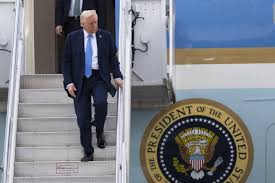President Donald Trump is once again making headlines, this time by floating the idea of serving a third term in office. In a recent interview, Trump hinted that he’s been considering ways to extend his time in the White House, despite the U.S. Constitution’s clear two-term limit.
“I’m not joking,” Trump told NBC News, adding that there are “methods” to make it happen. But can he really pull it off? And what would it mean for American democracy?
How Would Trump Serve a Third Term?
Though Trump didn’t get into specifics, one possibility he mentioned is running as vice president in 2028 under someone like JD Vance. If that ticket won, the president could then step aside, allowing Trump to reclaim the Oval Office.

This approach might sound like a political loophole, but many legal experts are already throwing cold water on the idea. The 22nd Amendment clearly states that no one can be elected president more than twice. Even if Trump were to become VP first, constitutional scholars argue it wouldn’t change the fact that he’s already served two terms.
Of course, Trump is known for pushing boundaries and challenging norms. If there’s a way to test this rule, he’s likely to try it.
Could Congress Change the Rules?
One Republican congressman, Andy Ogles from Tennessee, has already introduced a proposal to amend the Constitution. His idea? Allow a president to serve a third term as long as their two previous terms weren’t consecutive.
This would be a direct response to Trump’s situation, as he would be serving his second term (if he wins in 2024) non-consecutively after losing in 2020.
But here’s the catch: changing the Constitution is extremely difficult. It requires a two-thirds majority in both the House and Senate, followed by approval from three-quarters of the states. Given the deep divisions in American politics, that’s a long shot.
Why the Two-Term Limit Exists
The two-term rule wasn’t always a thing. It became law after Franklin D. Roosevelt won four consecutive elections, serving from 1933 until his death in 1945. Concerned about the possibility of a president holding power for too long, Congress passed the 22nd Amendment in 1951, officially limiting presidents to two terms.
Since then, every U.S. president has followed this rule—though a few, including Ronald Reagan and Barack Obama, have joked about serving a third term. Trump, however, seems to be the first to seriously explore the idea.
What Do Americans Think?
Trump insists that many people want him to stay in office beyond two terms. His loyal supporters often say they’d vote for him as long as he keeps running.
However, polling suggests the idea of a third term is deeply polarizing. While Trump’s base might back him, many Americans—including some conservatives—are wary of any move that could erode democratic norms.
There’s also the concern that even entertaining the idea sets a dangerous precedent. If one president finds a way to bend the rules, what’s to stop future leaders from doing the same?
What’s Next?
For now, Trump’s talk of a third term is just that—talk. While he’s certainly skilled at stirring up conversation and keeping himself in the news, the legal and political barriers standing in his way are enormous.
Still, given Trump’s history of challenging the system, it’s safe to say this won’t be the last time we hear about his ambitions beyond 2028.
